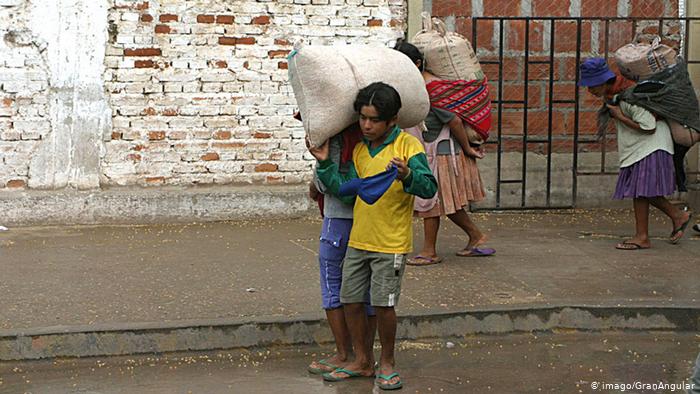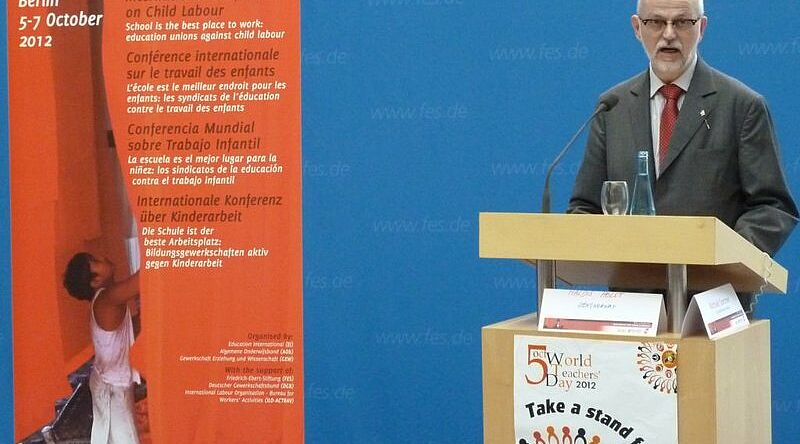OR compulsory education and Article 12 GG (freedom of choice of profession)
As one of the great arguments in favor of maintaining compulsory education and as a highlight of their achievements, it is still said that their introduction was necessary in order to cope with the increasing exploitation of children and young people in factories and in the parental household.
In addition, compulsory schooling was the only way, especially in the early days of industrialization, to give children freedom to guarantee a minimum level of education, primarily knowledge of reading, writing and arithmetic. Today, the reasoning also tends to shift towards protection against neglect, social isolation and school as a place of recognition, refuge and lifeline for many children.
I do not want to deny that the opportunity to go to school was a blessing for many young people and a way to escape the extensive exploitation in industrial companies, particularly in the early days of industrialization. And even today I know young people who fear the holidays and see their teacher as the only trustworthy adult caregiver.
What keeps me busy with the reasoning discussed above, however, is aimed in a different direction and perhaps explains the admittedly provocative and striking title of this article:
I would like to make the thesis that the German compulsory schooling laws, the state constitutions that contain the definition of general compulsory schooling, as well as the practical compulsion of young people to attend school and to submit to school regulations are inadmissible in violation of Article 12 of the Basic Law of the Federal Republic Germany violate.
Let us assume that it is our task to legitimately protect young people against exploitation, coercion and / or neglect or violence and to take specific measures to do this.
How would we see the introduction of a general, seamless compulsory event today? What challenges do we face as legislators?
Dilemma 1: To what extent did the introduction of compulsory schooling initially protect young people from exploitation by parents and industry?
When I ask this question, I always have to think about the generation of my grandparents and sometimes also that of my parents. I know from my grandmother that she had to get up very early and have already done her "duties in the house" before school. After school there were further duties. She was only given the bare essentials for going to school.
Did she have to work less or more because of compulsory education? Would someone have helped her and prevented the excessive work if she had complained to any "official position" (which one in Germany at the beginning of the 20th century?), Or had she been sent away and given her serious problems because of her insolence? I can no longer ask her because she has already passed away.
Nevertheless, it was admittedly hardly possible to go to school and work in an industrial company at the same time, although that cannot be ruled out either. Over time, however, the paradigm appears to have spread and prevailed:
“Children don’t work, they go to school. School is also the most important thing. Other activities are subordinate. «
I remember that I actually had a job outside of school as a teenager. Voluntarily and often with joy. The money I made was my own – I was proud to have it and to save it, to spend it, to make someone happy. Is that still common today? Is there time in addition to tutoring, all-day school, homework …?
Dilemma 2: Was compulsory schooling the best available solution to the “child labor problem” when it was introduced??
I think that this question is very difficult and at the same time very easy to answer – depending on the perspective from which it is viewed.
From the decision-makers point of view there were completely different criteria that led to the introduction of compulsory education, I have no doubt about that. However, I do not want to expand these criteria here and bring them into the discussion, because they would ultimately lead past the topic. It seems certain to me that from the decision-makers’ point of view, i.e. from a political point of view, a measure had to meet the following criteria:
- she had to QUICKLY IMPLEMENTABLE and shouldn’t take decades.
- If possible, she had to EASY TO IMPLEMENT AND EASILY TO CONTROL and thus in the specific individual case ENFORCEABLE his.
- she was allowed NOT TOO COMPLEX his.
A measure that best meets these criteria is:
- ALL AREA AREA, regardless of whether they are at risk of exploitation or affected.
- EXISTING RESOURCES BENEFITS and only expanded (the school model had been around for centuries, if not across the board).
- after this "Sower" is working.
The compulsory school attendance seems to me to have been one of the best measures available.
From the perspective of the young people concerned things look more complicated. For one thing, different people were in very different situations.
Boys and girls who were massively exploited, who were denied all access to education, play, who had to work hard physically and who had to work under inhumane conditions, certainly found school attendance partially a blessing. Even if punishment and emotional hardship were the order of the day in schools, it was often the lesser evil for such boys and girls.
I also know the saying from my grandmother: »I didn’t like going to school because it wasn’t nice there and nobody was nice to me. But it was sometimes a rest from home. ”She would have preferred a friendlier home or other refuge that would have given her education, as well as respectful encounters at eye level and security against assault, especially since she often received violent blows from hers Teacher had to take it.
Girls and boys who felt comfortable in their environment (and no one can tell me that they did not exist at the time), who were allowed to educate themselves and who were not exploited, might not necessarily find compulsory school attendance a welcome rescue. From what too? When it came to access to educational opportunities in the sense of reading, writing and arithmetic, one would have (apart from the fact that at the time of compulsory education the literacy rate was not at all low, just as little as the skills of people and logically think) may have liked to have the opportunity, for example, to visit a person who is particularly literate and to learn from him. However, did any of these young people want to be forced to do so – as eagerly as he might have voluntarily accepted such an offer? I have great doubts.
The question of compulsory schooling as the "best available solution to the child labor problem in the early days of the industrial age" is thus answered for me – albeit ambiguously.
I would like to grapple with the answer to the question of protection against neglect and domestic violence here, since it tells us about the actual topic of the article and this issue of the freeers-magazine leads away: It is clear that a person who experiences massive violence at home is protected from this violence as soon as he is in an area to which the perpetrators have no access. But experience has shown that this only protects him for this time and only against this one violence in his life. Many teachers, especially at the so-called special schools, do almost inhumane things here by being caregivers, confidants and maybe even partial protectors for these young people. However, it must always be clearly emphasized that this is not their actual task and can be permanent, and that their possibilities are massively limited.
What should we pay attention to, still in our intended decision-making role, today when we think about "child labor"?
We should do away with today’s comprehensive forced labor for children and adolescents in Germany!
If I took this slogan somewhere on the street, probably almost 100% of the people watching me would look at me blankly or openly show me a bird (if they did not relieve their possibly coming aggression in an even worse way).
What do I mean by that? There is no longer any forced labor. This is regulated by the Basic Law with Article 12 on freedom of choice of profession.
Let us take a closer look at the article on the so-called "ban on forced labor".
In doing so, I deliberately exclude the forced labor of prison inmates, which is still legal and practiced in accordance with Article 12 sentence (3) GG, because it would be interesting to discuss this fact: schoolchildren are not detainees within the meaning of Article 12 GG. Sentence (3) from Article 12 GG is therefore irrelevant to our question.
1 Article 12 paragraph (1) GG mainly uses terms that are designed for the working life of adults. Therefore, Article 12 of the Basic Law receives little attention in connection with matters of young people who are not yet in employment.
As was probably easy to foresee, I am again concerned with compulsory schooling, primarily in connection with paragraph (2) of Article. 12 GG, which stipulates that "nobody" (not even a young person) "may [be] forced to do a certain job, except as part of a public service obligation that is the same for everyone."
School attendance is clearly not a public service obligation, and it is certainly not equally mandatory for everyone. People who have not yet reached (very arbitrarily determined) school age or have already outgrown it do not yet have this obligation or no longer.
According to the School Act, young people have to "take part in school events as schoolchildren, to provide their own achievements and the necessary proof of achievement". 2
In addition, they have to follow the instructions of the teachers, otherwise there is a risk of ranting and pressure, bad grades, entries in the class register, detention, penal work, discussions with parents, teaching references, "staying seated" and even being expelled from school.
Young people are therefore forced to work by the school law and compulsory school, free of charge, for several hours a day, for years and with no alternative. If »pupils« completely refuse, so if they stay away from class, they are known to be brought to school with police force, even if they have been previously expelled from school. Then, if there is no other way, it will be sent to the responsible special school, because it cannot be excluded. Separation from their family and placement in a boarding school or psychiatric facility also threaten young people if they persistently refuse.
In my opinion, all of this is extremely questionable against the background of the so-called forced labor ban under Article 12 GG.
Today, all boys and girls of school age are forced to go to the "school workplace" and do work there, regardless of whether they had chosen it themselves, whether they actually had "better things to do" and no matter if it’s good for you.
Is this legitimate in the sense of the Basic Law, just because this "working" does not serve to earn a living and should at least superficially and in the short term not help anyone except the young person himself?
I also allow myself a comparison with the "free career choice" among adults:
Apart from the fact that no adult person would be forced to work with police force and that every adult person can also decide that he is not employed at all, provided that he is willing to bear the financial consequences of it, I wonder if this is allowed should be to educate yourself as a young person without attending school always the following (admittedly somewhat polemical) question in mind:
Is it actually okay for us to allow adults to work freelance or professionally? We shouldn’t even have to think about it?
Young people who really live and learn freely, self-determined and self-organized seem to me more and more like self-employed people, like freelancers, like young, dynamic entrepreneurs, who achieve their goals with verve and almost inexhaustible energy and time consequences – and not like lazy, refusing to stay away from education, as it is often assumed.
Adult entrepreneurs and people who take their lives in their own hands and stand on their own feet, sometimes against all prophecies of doom and with initial setbacks and financial losses, encounter almost without exception admiration and respect in our society (and of course also envy). On the other hand, young people who claim such a path are stigmatized as failures, patronized and prevented by massive reprisals from realizing their goals. Isn’t that strange?
I would also like to ask myself – again in connection with compulsory schooling – whether it is "okay" that people below a certain age limit should not be allowed to work in Germany for a fee or that their right to do so is severely restricted to a certain one Duration, on certain activities, on a certain maximum remuneration?
I am wisely not referring to the situation in countries where young people work as a matter of course, contribute to family income and may therefore come into conflict today with efforts to restrict "child labor", which can be very stressful and offensive. I also consciously ignore the still widespread industrial exploitation of young people in carpet weaving mills, diamond mines and similar sites.
I wonder again: Why is voluntary work in a self-chosen activity that can be abandoned at any time and in which a young person receives an appropriate wage, to be dismissed as exploitative child labor or legally equivalent to it?
Here, too, the problem is certainly not so much the malice of the "decision-maker", but rather the need for a practical solution from their point of view, again with the criteria
- quick and easy to implement
- easy controllability
- concrete enforceability and
- low complexity
play a major role.
With appropriate willingness and good will, however, solutions could certainly be found here that could adequately satisfy the need of young people for their own, valued work.
However, what particularly concerns me, especially in connection with compulsory schooling, when we as society and the state decide to affirm and maintain a ban on "child labor" as it exists today:
- Young people should not yet be allowed to work in a company. How can it be that students have to complete mandatory internships? Why may (or must) be ten-year-olds in some schools?
- Why are free social hours, for example due to a school violation, ok and even beneficial for a young person, voluntary work in an animal shelter or other institution, but prohibited child labor?
- The ban on child labor is designed to protect young people from harm caused by physical, mental and intellectual exploitation. Who protects young people from the dangers that threaten their bodies by sitting in classrooms for hours, by lack of sunlight and fresh air, by lack of exercise, etc.? Is spine damage from sitting in the classroom for hours less bad than spinal damage from sitting in front of a loom for hours? Who protects them from the mental dulling that is caused by the compulsory occupation with activities and topics that do not interest them? Who protects them from emotional threats through coercion, bullying, praise and punishment?
For me there is a strong contradiction here.
How can long-term activities of young people prescribed by the state, enforced in cases of doubt, be legal, orderly, correct and even necessary if the rule in our country is: "Child labor prohibited!"
Only a strong taboo can obscure the fact that young people in Germany do forced labor – I think so important, to expose this taboo, even if I may have to reveal myself to be ridiculous.
Article 12 GG [freedom to choose a profession]:
(1) All Germans have the right to choose their profession, job and training facility. The profession can be regulated by law or on the basis of a law.
(2) Nobody may be forced to do a certain job, except as part of a conventional general public service obligation that is the same for everyone.
(3) Forced labor is only permitted in the case of a deprivation of liberty ordered by a court.
(From the current version of the Basic Law of the Federal Republic of Germany at the time of publication of this article)
The Free-Forming Initiative – INFSB:
We are an initiative that advocates the right of everyone to be free and self-determined – even without attending school. What we all have in common is the wish that young people in Germany can take this path without them and their families coming into conflict with the law and the authorities and without fear of reprisals. For this purpose, we provide educational work at all levels of politics, administration and society throughout Germany and in networked national groups.
Website: infsb.de

The article is 2018 in issue 79 – Children & Work appeared.
RELATED ITEMS
-
Child labor: child labor in Europe – human rights – history – planet knowledge
New section on child labor in Europe By Ulla Rehbein / Tobias Aufmkolk Oliver Twist and the pit children in English mines: Many people think of that…
-

Prohibition of child labor is not a solution ″, world, dw
In many countries, even the smallest have to earn money to ensure the family’s livelihood. Generally, you shouldn’t forbid this,…
-
Human rights: child labor – human rights – history – planet knowledge
New section on child labor Knotting carpets by Ulla Rehbein, hewing stones, slaving as house slaves, working in plantations – working all over the world…
-

What to do about child labor: gew – the education union
Many of the goods we consume every day are made by minors. But in the fight against child labor, teachers all over the world play a role…
